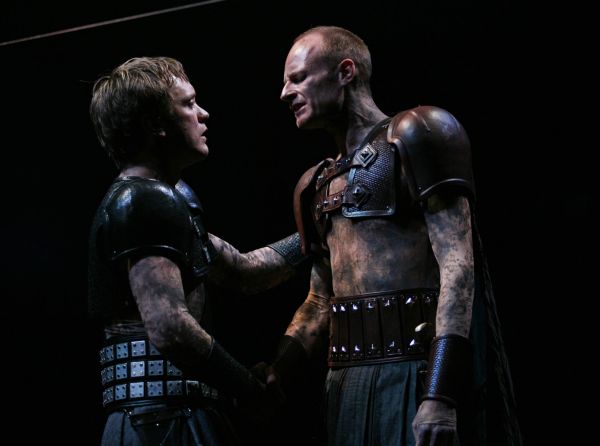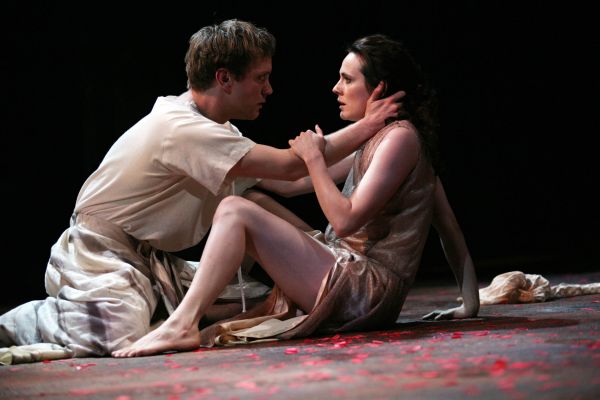Problematic in performance in a way that the “problem plays” simply aren’t, Shakespeare’s Roman plays remain some of his hardest to stage satisfactorily. Updated versions too often turn into Magritte-esque fantasies of identikit, suited politicos, while the togas of more traditional approaches can feel absurd, unavoidably laden with satiric or Hollywood associations. Courting rather than rejecting evocations of the latter, Lucy Bailey’s 2009 Julius Caesar for the RSC brings cinematic scope and contemporary gore to its treachery, demanding that its audience lend not only ears, but eyes, stomach and imagination to the action.
Bailey – she of the notorious faint and vomit-inducing Titus Andronicus at the Globe – revels here in an unusually broad visual canvas. A series of video screens are incorporated into William Dudley’s set: burning torches flare on the hillside above a Rome caught in civil war; a stone-eyed she-wolf watches down as Rome’s founding brothers Romulus and Remus fight to the death; crowds of Lupercalian revellers dance and shout, multiplying the actors a hundredfold.
It’s an approach that frames the action, giving heft and scope to the play’s necessarily small-scale encounters, yet somehow fails to integrate, drawing the mind away from Shakespeare’s psychological close-ups and ever back to the wide shot. For a work whose very text, rife with anachronisms, insists on the transferable values of its encounters, such a literal grounding in the Roman scene seems a little perverse. It risks the macho, style-over-substance flaws that blighted HBO’s Rome – a series whose influence Bailey freely acknowledges.
 The argument at work here (for argument it is, worked through with perhaps too unyielding a clarity) is one of origins. Just as the conspirators’ coup is born in the blood of the slain Caesar, so Rome’s own birth sprang fresh from the murder of Remus. Bestiality is everywhere present, bursting forth in the primitive rites of the Lupercal, with their whip-wielding wolf-men, and mirrored in the pack murders of Caesar and, later, Cinna the poet. The head of an enemy is tossed casually across the stage by a worldly Mark Antony (Darrell D’Silva), a fleshy prize in the turf-struggle of war.
The argument at work here (for argument it is, worked through with perhaps too unyielding a clarity) is one of origins. Just as the conspirators’ coup is born in the blood of the slain Caesar, so Rome’s own birth sprang fresh from the murder of Remus. Bestiality is everywhere present, bursting forth in the primitive rites of the Lupercal, with their whip-wielding wolf-men, and mirrored in the pack murders of Caesar and, later, Cinna the poet. The head of an enemy is tossed casually across the stage by a worldly Mark Antony (Darrell D’Silva), a fleshy prize in the turf-struggle of war.
This revival restores most the original cast to their roles. Greg Hicks still makes for a rather unusual Caesar, all wiry self-regard and awkward gesture. While it is hard to imagine him commanding the loyalty and awe of his subjects, he is perhaps far closer to Shakespeare’s Caesar than is often seen, a man deaf in one ear who narrowly escapes drowning while proving his strength, a man swayed by persuasion and flattery – truly the “underling” he speaks of.
In John Mackay (pictured above with Sam Troughton as Brutus) we have a Cassius undeniably lean but rather less than hungry. Oddly stilted and with far more stumbles than a revival should merit, his lack of discernable character may have been deliberate, aiming for the pathos of banality, but played out as much too subtle against Bailey’s primary-coloured canvas. The glorious scene of the persuasion of Brutus, surely the balance and counterweight of Antony’s irony-heavy “Friends, Romans…”, lacked stature, failing to provide Sam Troughton’s Brutus with a worthy catalyst for his change of heart.
 Troughton (pictured left with Hannah Young as Portia), fresh from his recent stint as Romeo, remains the dominant force of this production. A sincere, liberal-thinking friend, his Brutus is caught up in the self-deluding cycles of honour and valour, his confusion painfully evident in his vision of his conspirators as “purgers” rather than “murderers”. Balanced by the deranged menace of Oliver Ryan’s Casca (what an interesting Cassius he would have made), Troughton provides a much-needed rallying point for an audience denied much by way of decisive characterisation.
Troughton (pictured left with Hannah Young as Portia), fresh from his recent stint as Romeo, remains the dominant force of this production. A sincere, liberal-thinking friend, his Brutus is caught up in the self-deluding cycles of honour and valour, his confusion painfully evident in his vision of his conspirators as “purgers” rather than “murderers”. Balanced by the deranged menace of Oliver Ryan’s Casca (what an interesting Cassius he would have made), Troughton provides a much-needed rallying point for an audience denied much by way of decisive characterisation.
D’Silva’s Antony, fleshily rough and life-hardened, yields a rather counterintuitive speech to the Roman people. Deliberately syncopating the rhythms and natural pacing of the text, his is a study in contrarian impact – successful, but not altogether pleasingly so.
It’s hard not to watch this production and think of the natural advantages of the Globe for such material. As 2006’s Coriolanus demonstrated, it is impossible to overestimate the dramatic impact of groundlings in a work where the plebs take such a central role, an impact no amount of video-generated images can match. While a comfortable theatre space, the RSC’s Roundhouse structure lacks the acoustics or energy generated by the Globe, an energy this fractured play sorely needs if it is to have any hope of coherence. Bailey’s production has sound and fury in plenty, but no amount of assault can satisfy in a play that should cajole and woo.
- Julius Caesar is at the Roundhouse until 5 February
- See what’s on at the RSC this year
- Find Julius Caesar on Amazon















Add comment